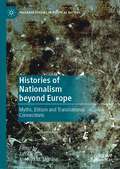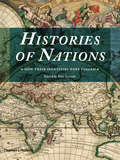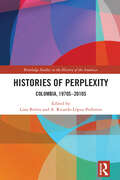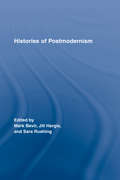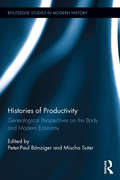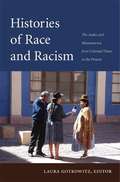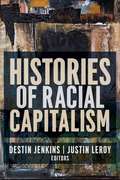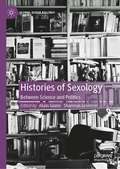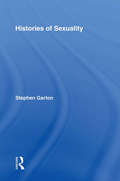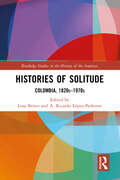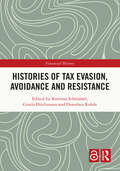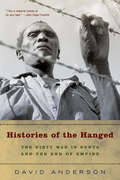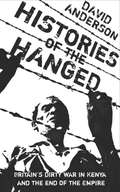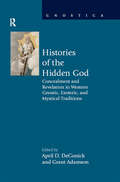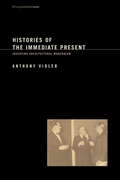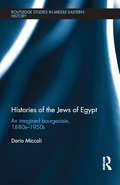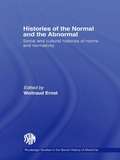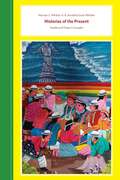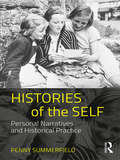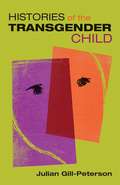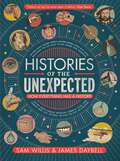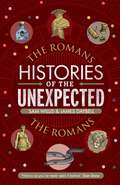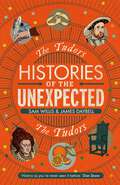- Table View
- List View
Histories of Nationalism beyond Europe: Myths, Elitism and Transnational Connections (Palgrave Studies in Political History)
by Jan Záhořík Antonio M. MoroneThis edited collection explores varying shapes of nationalism in different regional and historical settings in order to analyse the important role that nationalism has played in shaping the contemporary world. Taking a global approach, the collection includes case studies from the Middle East, Africa, Asia and North America. Unique not only in its wide range of geographically diverse case studies, this book is also innovative due to its comparative approach that combines different perspectives on how nations have been understood and how they came into being, highlighting the transnational connections between various countries. The authors examine what is meant by the concepts of ‘nation’ and ‘national identity,’ discussing themes such as citizenship, ethnicity, historical symbols and the role of elites. By exploring these entangled categories of nationalism, the authors argue that throughout history, elites have created ‘artificial ’ versions of nationalism through symbolism and mythology, which has led to nationalism being understood through social constructivist or primordialist lenses. This diverse collection will appeal to researchers studying nationalism, including historians, political scientists and anthropologists.
Histories of Nations: How Their Identities Were Forged
by Peter FurtadoTwenty-eight intimate and unconventional autobiographies of the nation/state, told by historians from their respective countries. Global histories tend to be written from the narrow viewpoint of a single author and a single perspective, with the inevitable bias that it entails. But in this thought-provoking collection, twenty-eight writers and scholars give engaging, often passionate accounts of their own nation's history. The countries have been selected to represent every continent and every type of state: large and small; mature democracies and religious autocracies; states that have existed for thousands of years and those born as recently as the twentieth century. Together they contain two-thirds of the world's population. In the United States, for example, the myth of the nation's "historylessness" remains strong, but in China history is seen to play a crucial role in legitimizing three thousand years of imperial authority. "History wars" over the content of textbooks rage in countries as diverse as Australia, Russia, and Japan. Some countries, such as Iran or Egypt, are blessed--or cursed--with a glorious ancient history that the present cannot equal; others, such as Germany, must find ways of approaching and reconciling the pain of the recent past.
Histories of Perplexity: Colombia, 1970s-2010s (Routledge Studies in the History of the Americas)
by Lina Britto A. Ricardo López-PedrerosBy combining chronological coverage, analytical breadth, and interdisciplinary approaches, these two volumes—Histories of Solitude and Histories of Perplexity—study the histories of Colombia over the past two centuries as illustrations of the histories of democracy across the Americas.The volumes bring together over 40 scholars based in Colombia, the United States, England, and Canada working in various disciplines to discuss how a country that has been consistently presented as a rarity in Latin America provides critical examples to re-examine major historical problems: republicanism and liberalism; export economies and agrarian modernization; populism and cultural politics of state formation; revolutionary and counterinsurgent Cold War violence; neoliberal reforms and urban development; popular mobilization and counterhegemonic public spheres; political ecologies and environmental struggles; and labors of memory and the challenge of reconciliation. Contributors are sensitive to questions of subjectivity and discourse, observant of ethnographic details and micro-politics, and attuned to macro-perspectives such as transnational and global histories.These volumes offer fresh perspectives on Colombia and will be of great value to those interested in Latin American and Caribbean history.
Histories of Postmodernism (Routledge Studies in Cultural History #5)
by Mark Bevir; Jill Hargis; Sara RushingHistories of Postmodernism reexamines the history of the constellation of ideas and thinkers associated with postmodernism. The increasingly dominant historical narrative depicts a relatively smooth development of ideas from Friedrich Nietzsche and Martin Heidegger, through a range of French theorists, most notably Jacques Derrida and Michel Foucault, to contemporary American thinkers such as Richard Rorty, Edward Said, and Judith Butler. Histories of Postmodernism challenges this narrative by highlighting the local contexts of relevant theorists and thus the crucial distinctions that divide successive articulations of the themes and concepts associated with postmodernism. As postmodern ideas traveled from nineteenth-century Germany to mid-twentieth-century France and on to the contemporary United States, so the relevant theorists transformed that heritage within the context of particular intellectual traditions and specific political and aesthetic issues.
Histories of Productivity: Genealogical Perspectives on the Body and Modern Economy (Routledge Studies in Modern History #21)
by Peter-Paul Banziger Mischa SuterGlobal issues such as climate change and the aftermath of the 2008 financial crisis have spurred interest in thinking about the history of the modern economy that goes beyond disciplinary economic history. This book contributes to the cultural history of capitalism and its different regimes of productivity by pursuing the perspective of body history and by providing a global scope. Throughout modernity, the body served as a fundamental, albeit essentially changing, linchpin for both the organization of economic practices and for intellectual reflections on the economy. In particular, it was the pivotal interface to render notions of economic productivity intelligible. The book explores this central thesis in a range of case studies, drawing on source material from West Africa, Europe, Mexico, and the US. Framed by a theoretically informed introduction, which also provides a conceptual history of notions of productivity, and by an afterword that brings the approaches explored in this volume into dialogue with scholarship inspired by Marx and Foucault, the individual chapters tackle the concept of productivity from a wide array of angles, each illuminating the promises and problems of a cultural take on the history of economic productivity.
Histories of Race and Racism: The Andes and Mesoamerica from Colonial Times to the Present
by Laura GotkowitzNinety percent of the indigenous population in the Americas lives in the Andean and Mesoamerican nations of Bolivia, Ecuador, Mexico, Peru, and Guatemala. Recently indigenous social movements in these countries have intensified debate about racism and drawn attention to the connections between present-day discrimination and centuries of colonialism and violence. In Histories of Race and Racism, anthropologists, historians, and sociologists consider the experiences and representations of Andean and Mesoamerican indigenous peoples from the early colonial era to the present. Many of the essays focus on Bolivia, where the election of the country's first indigenous president, Evo Morales, sparked fierce disputes over political power, ethnic rights, and visions of the nation. The contributors compare the interplay of race and racism with class, gender, nationality, and regionalism in Bolivia, Ecuador, Guatemala, Mexico, and Peru. In the process, they engage issues including labor, education, census taking, cultural appropriation and performance, mestizaje, social mobilization, and antiracist legislation. Their essays shed new light on the present by describing how race and racism have mattered in particular Andean and Mesoamerican societies at specific moments in time.ContributorsRossana BarragánKathryn BurnsAndrés CallaPamela CallaRudi Colloredo-MansfeldMaría Elena GarcíaLaura GotkowitzCharles R. HaleBrooke LarsonClaudio LomnitzJosé Antonio LuceroFlorencia E. MallonKhantuta MuruchiDeborah PooleSeemin QayumArturo Taracena ArriolaSinclair ThomsonEsteban Ticona Alejo
Histories of Racial Capitalism (Columbia Studies in the History of U.S. Capitalism)
by Jenkins, Destin; Leroy, JustinThe relationship between race and capitalism is one of the most enduring and controversial historical debates. The concept of racial capitalism offers a way out of this impasse. Racial capitalism is not simply a permutation, phase, or stage in the larger history of capitalism—since the beginning of the Atlantic slave trade and the colonization of the Americas, capitalism, in both material and ideological senses, has been racial, deriving social and economic value from racial classification and stratification. Although Cedric J. Robinson popularized the term, racial capitalism has remained undertheorized for nearly four decades.Histories of Racial Capitalism brings together for the first time distinguished and rising scholars to consider the utility of the concept across historical settings. These scholars offer dynamic accounts of the relationship between social relations of exploitation and the racial terms through which they were organized, justified, and contested. Deploying an eclectic array of methods, their works range from indigenous mortgage foreclosures to the legacies of Atlantic-world maroons, from imperial expansion in the continental United States and beyond to the racial politics of municipal debt in the New South, from the ethical complexities of Latinx banking to the postcolonial dilemmas of extraction in the Caribbean. Throughout, the contributors consider and challenge how some claims about the history and nature of capitalism are universalized while others remain marginalized. By theorizing and testing the concept of racial capitalism in different historical circumstances, this book shows its analytical and political power for today’s scholars and activists.
Histories of Sexology: Between Science and Politics (Global Queer Politics)
by Alain Giami Sharman LevinsonHistories of Sexology: Between Science and Politics takes an interdisciplinary and reflexive approach to the historiography of sexology. Drawing on an intellectual history perspective informed by recent developments in science and technology studies and political history of science, this book examines specific social, cultural, intellectual, scientific and political contexts that have given shape to theories of sexuality, but also to practices in medicine, psychology, education and sexology. Furthermore, it explores various ways that theories of sexuality have both informed and been produced by sexologies—as scientific and clinical discourses about sex—in Western countries since the 19th century.
Histories of Sexuality: Antiquity to Sexual Revolution
by Stephen Garton"First Published in 2004, Routledge is an imprint of Taylor & Francis, an informa company."
Histories of Solitude: Colombia, 1820s-1970s (Routledge Studies in the History of the Americas)
by Lina Britto López-Pedreros, A. RicardoBy combining chronological coverage, analytical breadth, and interdisciplinary approaches, these two volumes—Histories of Solitude and Histories of Perplexity—study the histories of Colombia over the last two centuries as illustrations of the histories of democracy across the Americas.The volumes bring together over 40 scholars based in Colombia, the United States, England, and Canada working in various disciplines to discuss how a country that has been consistently presented as a rarity in Latin America provides critical examples to re-examine major historical problems: republicanism and liberalism; export economies and agrarian modernization; populism and cultural politics of state formation; revolutionary and counterinsurgent Cold War violence; neoliberal reforms and urban development; popular mobilization and counterhegemonic public spheres; political ecologies and environmental struggles; and labors of memory and the challenge of reconciliation. Contributors are sensitive to questions of subjectivity and discourse, observant of ethnographic details and micro-politics, and attuned to macro-perspectives such as transnational and global histories.These volumes offer fresh perspectives on Colombia and will be of great value to those interested in Latin American and Caribbean history.
Histories of Suicide
by David Wright John WeaverSuicide is one of the leading causes of death worldwide, with more than one million fatalities each year. During the post-war period, the rate of completed suicides has risen dramatically, especially among young men and Aboriginal peoples living in the Western world. While this has naturally led to growing concern amongst health care practitioners and policy experts, relatively little is known about the history of attempted and completed suicide. Histories of Suicide is the first book to examine the history of suicide in diverse national contexts, including Japan, Scotland, Australia, Soviet Russia, Peru, United States, France, South Africa, and Canada, to reveal the different social, political, economic, and cultural factors that inform our understanding of suicide. This interdisciplinary collection of essays assembles historians, health economists, anthropologists, and sociologists, who examine the history of suicide from a variety of approaches to provide crucial insight into how suicide differs across nations, cultures, and time periods. Focusing on developments from the eighteenth century to the present, the contributors examine vitally important topics such as the medicalization of suicide, representations of mental illness, psychiatric disputes, and the frequency of suicide amongst soldiers. An illuminating volume of studies, Histories of Suicide is a fascinating examination of the phenomenon of self-destruction throughout different historical periods and nations.
Histories of Tax Evasion, Avoidance and Resistance (Financial History #36)
by Dorothea Rohde Gisela HürlimannTax evasion, tax avoidance and tax resistance are widespread phenomena in political, economic, social and fiscal history from antiquity through medieval, early modern and modern times. This book shows how different groups and individuals around the globe have succeeded or failed in not paying their due taxes, whether in kind or in cash, on their properties or on their crops. It analyses how, throughout history, wealthy and poor taxpayers have tried to avoid or reduce their tax burden by negotiating with tax authorities, through practices of legal or illegal tax evasion, by filing lawsuits, seeking armed resistance or by migration, and how state authorities have dealt with such acts of claim making, defiance, open resistance or elusion. It fills an important research gap in tax history, addressing questions of tax morale and fairness, and how social and political inequality was negotiated through taxation. It gives rich insights into the development of citizen-state relationships throughout the course of history. The book comprises case studies from Ancient Athens, Roman Egypt, Medieval Europe, Early Modern Mexico, the Ottoman Empire, Nigeria under British colonial rule, the United Kingdom of the early 20th century, Greece during the Second World War, as well as West Germany, Switzerland, Sweden and the United States in the 20th century, including transnational entanglements in the world of late-modern offshore finance and taxation. The authors are experts in fiscal, economic, financial, legal, social and/or cultural history. The book is intended for students, researchers and scholars of economic and financial history, social and world history and political economy.
Histories of the Hanged: The Dirty War in Kenya and the End of Empire
by David Anderson"A remarkable account of Britain's last stand in Kenya. This is imperial history at its very best."--John Hope Franklin In "a gripping narrative that is all but impossible to put down" (Joseph C. Miller), Histories of the Hanged exposes the long-hidden colonial crimes of the British in Kenya. This groundbreaking work tells how the brutal war between the colonial government and the insurrectionist Mau Mau between 1952 and 1960 dominated the final bloody decade of imperialism in East Africa. Using extraordinary new evidence, David Anderson puts the colonial government on trial with eyewitness testimony from over 800 court cases and previously unseen archives. His research exonerates the Kikuyu rebels; hardly the terrorists they were thought to be; and reveals the British to be brutal aggressors in a "dirty war" that involved leaders at the highest ranks of the British government. This astonishing piece of scholarship portrays a teetering colonial empire in its final phase; employing whatever military and propaganda methods it could to preserve an order that could no longer hold.
Histories of the Hanged: Britain's Dirty War in Kenya and the End of Empire
by David AndersonThe true story of the Mau Mau rebellion of 1952-60 in Kenya, told for the first timeThis book tells for the first time the story of the dirty war the British fought in Kenya, in the run-up to the country's independence in 1964. In 1952, after years of tension and bitterness, the grievances of the Gikuyu people of central Kenya exploded into open rebellion. Only 32 European settlers died in the subsequent fighting, but more than 1,800 African civilians, over 3,000 African police and soldiers, and 12,000 Mau Mau rebels were killed. Between 1953 and 1956 Britain sent over a thousand Kenyans to the gallows, often on trumped up or non-existent charges. Meanwhile 70,000 people were imprisoned in camps without trial for between two and six years. David Anderson provides a full and convincing account of a war in which all sides behaved badly, and therefore few of the combatants can be either fully excused, or blamed. These events are still within living memory, and eye-witness testimonies provide the backbone of this controversial story.
Histories of the Hanged: Britain's Dirty War in Kenya and the End of Empire
by David AndersonThe true story of the Mau Mau rebellion of 1952-60 in Kenya, told for the first timeThis book tells for the first time the story of the dirty war the British fought in Kenya, in the run-up to the country's independence in 1964. In 1952, after years of tension and bitterness, the grievances of the Gikuyu people of central Kenya exploded into open rebellion. Only 32 European settlers died in the subsequent fighting, but more than 1,800 African civilians, over 3,000 African police and soldiers, and 12,000 Mau Mau rebels were killed. Between 1953 and 1956 Britain sent over a thousand Kenyans to the gallows, often on trumped up or non-existent charges. Meanwhile 70,000 people were imprisoned in camps without trial for between two and six years. David Anderson provides a full and convincing account of a war in which all sides behaved badly, and therefore few of the combatants can be either fully excused, or blamed. These events are still within living memory, and eye-witness testimonies provide the backbone of this controversial story.
Histories of the Hidden God: Concealment and Revelation in Western Gnostic, Esoteric, and Mystical Traditions (Gnostica)
by April D. Deconick Grant AdamsonIn Western religious traditions, God is conventionally conceived as a humanlike creator, lawgiver, and king, a being both accessible and actively present in history. Yet there is a concurrent and strong tradition of a God who actively hides. The two traditions have led to a tension between a God who is simultaneously accessible to humanity and yet inaccessible, a God who is both immanent and transcendent, present and absent. Western Gnostic, esoteric, and mystical thinking capitalizes on the hidden and hiding God. He becomes the hallmark of the mystics, Gnostics, sages, and artists who attempt to make accessible to humans the God who is secreted away. 'Histories of the Hidden God' explores this tradition from antiquity to today. The essays focus on three essential themes: the concealment of the hidden God; the human quest for the hidden God, and revelations of the hidden God.
Histories of the Immediate Present: Inventing Architectural Modernism (Writing Architecture)
by Anthony VidlerHow the different narratives of four historians of architectural modernism—Emil Kaufmann, Colin Rowe, Reyner Banham, and Manfredo Tafuri—advanced specific versions of modernism. Architecture, at least since the beginning of the twentieth century, has suspended historical references in favor of universalized abstraction. In the decades after the Second World War, when architectural historians began to assess the legacy of the avant-gardes in order to construct a coherent narrative of modernism's development, they were inevitably influenced by contemporary concerns. In Histories of the Immediate Present, Anthony Vidler examines the work of four historians of architectural modernism and the ways in which their histories were constructed as more or less overt programs for the theory and practice of design in a contemporary context. Vidler looks at the historical approaches of Emil Kaufmann, Colin Rowe, Reyner Banham, and Manfredo Tafuri, and the specific versions of modernism advanced by their historical narratives. Vidler shows that the modernism conceived by Kaufmann was, like the late Enlightenment projects he revered, one of pure, geometrical forms and elemental composition; that of Rowe saw mannerist ambiguity and complexity in contemporary design; Banham's modernism took its cue from the aspirations of the futurists; and the “Renaissance modernism” of Tafuri found its source in the division between the technical experimentation of Brunelleschi and the cultural nostalgia of Alberti. Vidler's investigation demonstrates the inevitable collusion between history and design that pervades all modern architectural discourse—and has given rise to some of the most interesting architectual experiments of the postwar period.
Histories of the Jews of Egypt: An Imagined Bourgeoisie, 1880s-1950s (Routledge Studies in Middle Eastern History)
by Dario MiccoliUp until the advent of Nasser and the 1956 War, a thriving and diverse Jewry lived in Egypt – mainly in the two cities of Alexandria and Cairo, heavily influencing the social and cultural history of the country. Histories of the Jews of Egypt argues that this Jewish diaspora should be viewed as "an imagined bourgeoisie". It demonstrates how, from the late nineteenth century up to the 1950s, a resilient bourgeois imaginary developed and influenced the lives of Egyptian Jews both in the public arena, in institutions such as the school, and in the home. From the schools of the Alliance Israélite Universelle and the Cairo lycée français to Alexandrian marriage contracts and interwar Zionist newspapers – this book explains how this imaginary was characterised by a great capacity to adapt to the evolutions of late nineteenth and early twentieth century Egypt, but later deteriorated alongside increasingly strong Arab nationalism and the political upheavals that the country experienced from the 1940s onwards. Offering a novel perspective on the history of modern Egypt and its Jews, and unravelling too often forgotten episodes and personalities which contributed to the making of an incredibly diverse and lively Jewish diaspora at the crossroads of Europe and the Middle East, this book is of interest to scholars of Modern Egypt, Jewish History and of Mediterranean History.
Histories of the Normal and the Abnormal: Social and Cultural Histories of Norms and Normativity (Routledge Studies in the Social History of Medicine)
by Waltraud ErnstThis fascinating volume tackles the history of the terms 'normal' and 'abnormal'. Originally meaning 'as occurring in nature', normality has taken on significant cultural gravitas and this book recognizes and explores that fact. The essays engage with the concepts of the normal and the abnormal from the perspectives of a variety of academic disciplines – ranging from art history to social history of medicine, literature, and science studies to sociology and cultural anthropology. The contributors use as their conceptual anchors the works of moral and political philosophers such as Canguilhem, Foucault and Hacking, as well as the ideas put forward by sociologists including Durkheim and Illich. With contributions from a range of scholars across differing disciplines, this book will have a broad appeal to students in many areas of history.
Histories of the Present: People and Power in Ecuador
by Norman E. Whitten Dorothea Scott WhittenThe wellspring of critical analysis in this book emerges from Ecuador's major Indigenous Uprising of 1990 and its ongoing aftermath in which indigenous and Afro-Ecuadorian action transformed the nation-state and established new dimensions of human relationships. The authors weave anthropological theory with longitudinal Ecuadorian ethnography to produce a unique contribution to Latin American studies.
Histories of the Self: Personal Narratives and Historical Practice
by Penny SummerfieldHistories of the Self interrogates historians’ work with personal narratives. It introduces students and researchers to scholarly approaches to diaries, letters, oral history and memoirs as sources that give access to intimate aspects of the past. Historians are interested as never before in how people thought and felt about their lives. This turn to the personal has focused attention on the capacity of subjective records to illuminate both individual experiences and the wider world within which narrators lived. However, sources such as letters, diaries, memoirs and oral history have been the subject of intense debate over the last forty years, concerning both their value and the uses to which they can be put. This book traces the engagement of historians of the personal with notions of historical reliability, and with the issue of representativeness, and it explores the ways in which they have overcome the scepticism of earlier practitioners. It celebrates their adventures with the meanings of the past buried in personal narratives and applauds their transformation of historical practice. Supported by case studies from across the globe and spanning the fifteenth to twenty-first centuries, Histories of the Self is essential reading for students and researchers interested in the ways personal testimony has been and can be used by historians.
Histories of the Transgender Child
by Julian Gill-PetersonA groundbreaking twentieth-century history of transgender children With transgender rights front and center in American politics, media, and culture, the pervasive myth still exists that today’s transgender children are a brand new generation—pioneers in a field of new obstacles and hurdles. Histories of the Transgender Child shatters this myth, uncovering a previously unknown twentieth-century history when transgender children not only existed but preexisted the term transgender and its predecessors, playing a central role in the medicalization of trans people, and all sex and gender.Beginning with the early 1900s when children with “ambiguous” sex first sought medical attention, to the 1930s when transgender people began to seek out doctors involved in altering children’s sex, to the invention of the category gender, and finally the 1960s and ’70s when, as the field institutionalized, transgender children began to take hormones, change their names, and even access gender confirmation, Julian Gill-Peterson reconstructs the medicalization and racialization of children’s bodies. Throughout, they foreground the racial history of medicine that excludes black and trans of color children through the concept of gender’s plasticity, placing race at the center of their analysis and at the center of transgender studies.Until now, little has been known about early transgender history and life and its relevance to children. Using a wealth of archival research from hospitals and clinics, including incredible personal letters from children to doctors, as well as scientific and medical literature, this book reaches back to the first half of the twentieth century—a time when the category transgender was not available but surely existed, in the lives of children and parents.
Histories of the Unexpected: How Everything Has a History (Histories Of The Unexpected Ser.)
by James Daybell Sam Willis'History as you've never seen it before.' Dan Snow'A wonderful, eclectic and entertaining history of everything, full of fascinating, surprising stories.' Suzannah LipscombDid you know that the history of the beard is connected to the Crimean War; that the history of paperclips is all about the Stasi; and that the history of bubbles is all about the French Revolution? And who knew that Heinrich Himmler, Tutankhamun and the history of needlework are linked to napalm and Victorian orphans?In Histories of the Unexpected, Sam Willis and James Daybell lead us on a journey of discovery that tackles some of the greatest historical themes - from the Tudors to the Second World War, from the Roman Empire to the Victorians - but via entirely unexpected subjects.By taking this revolutionary approach, they not only present a new way of thinking about the past, but also reveal the everyday world around us as never before.
Histories of the Unexpected: The Romans (Histories of the Unexpected)
by Sam Willis James DaybellThe Histories of the Unexpected series not only presents a new way of thinking about the past, but also reveals the world around us as never before. Traditionally, the Romans have been understood in a straightforward way but the period really comes alive if you take an unexpected approach to its history. Yes, emperors, the development of civilization and armies all have a fascinating history . . . but so too do tattoos, collecting, fattening, recycling, walking, poison, fish, inkwells and wicked stepmothers! Each of these subjects is equally fascinating in its own right, and each sheds new light on the traditional subjects and themes that we think we know so well.
Histories of the Unexpected: The Tudors (Histories of the Unexpected)
by James Daybell Sam WillisThe Histories of the Unexpected series not only presents a new way of thinking about the past, but also reveals the world around us as never before. Traditionally, the Tudors have been understood in a straightforward way but the period really comes alive if you take an unexpected approach to its history. Yes, Tudor monarchs, exploration and religion have a fascinating history . . . but so too do cannibalism, shrinking, bells, hats, mirrors, monsters, faces, letter-writing and accidents! Each of these subjects is equally fascinating in its own right, and each sheds new light on the traditional subjects and themes that we think we know so well.
